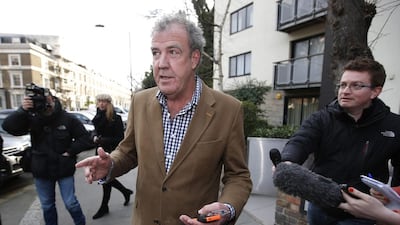In the fractured world of multi-channel television, where success is often measured by viewing figures in hundreds of thousands rather than millions, there are few individuals whose participation can guarantee a global audience. But Jeremy Clarkson, host of the BBC's motoring programme, Top Gear, is assuredly one. He has turned himself into a star and the programme into essential viewing. So successful is the show that it has become BBC Worldwide's most lucrative export, with sales topping $50 million (Dh184m).
Big, brash, politically incorrect, Clarkson harkens back to an era when men didn’t have to be quite so careful about what they said in public, which is why so many of his gender love his style and approach. His image is refreshingly unapologetic, with his penchant for stripy shirts and faded denims and with his potbelly hanging over his trouser tops.
It has taken a while for the details of the fracas which led to his sacking from the BBC to become public, but it seems that, on arriving by helicopter to a North Yorkshire hotel after a long day’s filming in Surrey, Clarkson was told that a hot meal was not available and that he’d have to make do with a platter of cold meats.
While there is little in Clarkson’s ample proportions to suggest an absence of food is a common occurrence, he can be forgiven if he felt less than impressed. Location filming is long and arduous work, and he surely had every right to expect a simple plate of steak and chips once he returned to base.
What happened next, however, was less easy to forgive. After berating the hotel staff for their incompetence, Clarkson turned his ire on the show’s producer, Irish-born Oisin Tymon. Having directed a stream of vitriol so laden with expletives that it had other hotel guests spluttering into their soup, Clarson followed Tymon into the hotel garden and punched him in the mouth, leaving him with a split lip and with blood running down his face.
Tymon drove himself to a hospital, while Clarkson made numerous attempts to contact him by phone and text in an unsuccessful attempt to apologise.
In the 1970s, when individuals such as Clarkson were commonplace in the world of broadcasting, such an outburst would have been dubbed not only unexceptional but part of the job spec. But time has moved on, even if Clarkson has not. From the moment his knuckles met Tymon’s lips, his fate was sealed.
Some see Clarkson’s outburst as an aberration; a one-off event for which he should be forgiven, with one online petition from dismayed fans garnering a million signatures. But Clarkson’s outburst was merely the end of a behavioural curve that has become increasingly erratic in recent years. In police parlance, he has “previous form”.
There was never much doubt as to the outcome. Despite the fact that Tymon has decided not to press charges, the end of Clarkson's involvement with Top Gear was only a matter of time.
So what now? Clarkson will have no shortage of offers from rival broadcasters. Among companies reported to be wooing him is Sky, whose owner, Rupert Murdoch, called the BBC’s decision “stupid” and described Clarkson as “a funny man with great expertise and a huge following”. Netflix is also rumoured to be preparing to offer him his own series.
The BBC, meanwhile, has a more ticklish problem. Does it replace Clarkson on Top Gear or write the show off altogether? Clarkson is a unique personality, and it's difficult to see any other candidate willing to inherit such a poisoned chalice.
At least there’s one international celebrity who has suddenly become available. Around the time Clarkson was being told to clear his desk, 22-year-old Zayn Malik was announcing his departure from One Direction.
Couldn’t they simply swap jobs? Young Zayn might take some time to find his feet in a programme dedicated to middle-aged men talking about cars, but I for one, would pay a great deal to see Clarkson fronting the world’s leading boy band.
Michael Simkins is an actor and writer based in London
On Twitter: @michael_simkins

